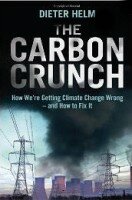The carbon crunch: how we’re getting climate change wrong – and how to fix it by Dieter Helm
Posted in Books on 11/14/2012 02:46 pm by Stephen Tindale Dieter Helm, professor of energy policy at Oxford University, is a leading voice in European energy policy. During 2011, he acted as a special adviser to energy commissioner Gunther Oettinger. Helm has now written a new book: The carbon crunch: how we’re getting climate change wrong – and how to fix it (Yale University Press, 2012). CER hosted a launch event for this in October 2012.
Dieter Helm, professor of energy policy at Oxford University, is a leading voice in European energy policy. During 2011, he acted as a special adviser to energy commissioner Gunther Oettinger. Helm has now written a new book: The carbon crunch: how we’re getting climate change wrong – and how to fix it (Yale University Press, 2012). CER hosted a launch event for this in October 2012.
The book begins by laying out the problem. The 1992 UN Framework Convention on Climate Change and its 1997 Kyoto Protocol have, in Helm’s view, achieved virtually nothing. This is partly because of the endless complex negotiations and partly because any agreements, though called legally-binding, are not enforceable. But the even more significant weakness, Helm argues, is that the design of Kyoto is wrong. The Kyoto approach seeks to reduce greenhouse gas production in signatory countries. It should instead address greenhouse gas consumption. If goods are manufactured in, say, China but then imported into, say, Europe, the emissions caused by the goods’ manufacture and transport should be attributed to Europe, not China.
Helm is critical of the EU’s claim that it leads the world on climate policy. This claim can only be made in terms of production emissions, not consumption emissions. Europe is de-industrialising, with more goods imported from China and other developing countries. Most of China’s energy comes from coal. So a shift from goods being manufactured and consumed in Europe to goods being manufactured in China then consumed in Europe leads to an increase in global emissions. Global emissions are what matter for the climate: it makes no difference where they occur.
Helm is also critical of the EU’s 2020 20-20-20 climate and energy package. As he says:
“The economic illiteracy is astonishing: for a long-term problem the Europeans chose a short-term target, and seem to have convinced themselves that the target and renewables and energy efficiency should all add up to the same magic number.”
Helm is not convinced that current wind or solar power technologies will contribute significantly to decarbonisation – though he suggests that technological advance and cost reductions may make solar significant in the future. He is neither pro- nor anti-nuclear, though he raises legitimate concerns about its economics. He also questions the economics and practicality of carbon capture and storage (CCS).
Instead, Helm argues for a coal-to-gas transition. He accepts that gas is not low carbon enough to provide total decarbonisation of the energy system. However, gas emits only half the greenhouse gases per unit of electricity generated as coal does. Gas stations could be retrofitted with CCS technology, but Helm argues that it would be wrong to make this a regulatory requirement, because the technology has yet to be demonstrated at scale. Gas power stations are quick and relatively cheap to construct. The cost of electricity from gas is largely driven by fuel costs, unlike nuclear or wind electricity, which require heavy capital investment but then has cheap or free fuel. So, Helm suggests, there should be a rapid expansion of gas generation, and the developers should be told that gas stations will be closed down around 2030. Coal power stations should be closed down as soon as possible.
How can this ‘coal-to-gas’ shift be achieved? Helm favours market mechanisms, but is not impressed by the Emissions Trading System (ETS). This has delivered very unstable prices, which for most of the time have been far too low to influence investment decisions. Helm argues instead for a carbon tax (as most economists do). The tax could be introduced at a relatively low level, but with a pre-announced escalation:
“Replacing low, volatile and short-term prices with a tax regime explicitly designed to be long-term would generate the expectation that, starting low, the price of carbon would rise”.
A higher carbon price would carry the danger of yet more de-industrialisation in Europe and increase in imports of goods (and the greenhouse gas emissions they embody) from places like China. However, Helm’s proposal would address this by taxing carbon consumption rather than carbon production. So goods being imported would be taxed on the basis of the calculated embodied carbon. To avoid falling foul of World Trade Organisation rules, any country that has its own carbon price would be exempt from these border taxes.
The prospect of exemption from EU border taxes would give other countries an incentive to introduce a carbon price. As Helm points out, all governments would prefer to collect revenue themselves rather than see the EU collect it. So this approach could help the expansion of carbon pricing.
Helm is right to argue that a bottom-up approach based on carbon pricing and carbon consumption could well achieve more than the top-down carbon production targets of the Kyoto Protocol. Indeed, it could hardly achieve less. Helm is also right to argue that a carbon tax would deliver more than emissions trading has done.
So ‘the carbon crunch’ outlines a strong policy approach which the EU could adopt, but the book is less strong on the politics of getting there. Jacques Delors spent much of his time as European Commission president arguing for a carbon/energy tax, but was defeated by member states arguing that tax is a matter for them – and each of them has a veto over tax proposals. The Commission did consult on border tax adjustments when it was last amending the ‘emissions trading directive’ in 2008, but dropped the idea, in part due to opposition to major exporting nations led by Germany. (The strongest supporter was former French president Nicholas Sarkozy.) Within the current Commission, Climate Action Commissioner Connie Hedegaard has said that border tax adjustments should not be ruled out, but there is no strong support from other commissioners.
If you are interested in learning more, please see my article on the Centre for European Reform website: How to confront the carbon crunch.


